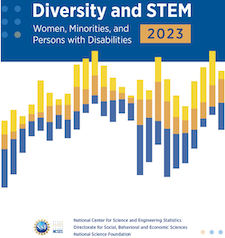 The National Science Foundation has released a new report entitled Diversity and STEM: Women, Minorities, and Persons with Disabilities 2023.
The National Science Foundation has released a new report entitled Diversity and STEM: Women, Minorities, and Persons with Disabilities 2023.
“Diversity is America’s unique advantage in science and technology,” said Sethuraman Panchanathan, director of the National Science Foundation. “Our global leadership depends upon diversity, leveraging different backgrounds, experiences, and points of view to bring unique insights to problem solving and discovery. The Diversity and STEM report provides objective, reliable data on where our nation has made progress towards access and equity in STEM education and careers, as well as where we must do more.”
The report shows more women, as well as Black, Hispanic, American Indian, and Alaska Native people collectively, worked in STEM jobs over the past decade, diversifying that workforce, and are earning more degrees in science and engineering fields at all levels compared to previous years. However, those groups broadly remain underrepresented in science, technology, engineering, and mathematics when compared to their overall distribution in the U.S. population, reflecting the larger equity challenges our nation faces.
Blacks were 14 percent of the U.S. population between the ages of 18 and 34 in 2020. They earned 10 percent of the associate’s degrees awarded in science and engineering fields, 9 percent of the bachelor’s degrees, 11 percent of the master’s degrees, and just 7 percent of the doctoral degrees. Black students had higher representation among U.S. citizens and permanent residents in the social and behavioral sciences, earning 12 percent of bachelor’s degrees in these fields in 2020, relative to 5 percent of bachelor’s degrees in engineering.
In 2021, Blacks were about 12 percent of the adult population in the United States but made up only 9 percent of the STEM workforce. In 2011, Blacks were 7 percent of all STEM workers. About 18 percent of all Black workers were employed in STEM fields compared to 25 percent of all White workers and 39 percent of Asian workers.
Black workers, on average, had lower wages than White or Asian workers in STEM fields. Blacks in STEM jobs had a median wage and salary income of $54,734 in 2020. Blacks in non-STEM jobs had a median wage and salary income of $34,990.










